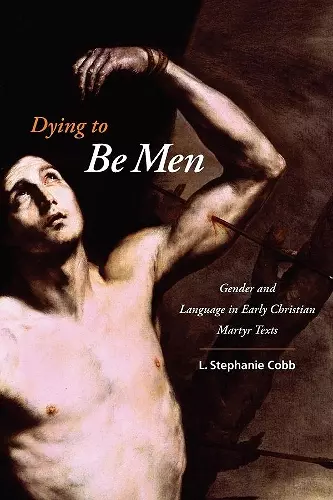Dying to Be Men
Gender and Language in Early Christian Martyr Texts
L Stephanie Professor Cobb author
Format:Hardback
Publisher:Columbia University Press
Published:19th Sep '08
Currently unavailable, and unfortunately no date known when it will be back

Dying to Be Men is exemplary of the kind of work sex/gender theory can do in historical research. -- Amy Hollywood, Harvard University In Dying to Be Men, gendered language is neither incidental nor metaphorical. Rather, claims to masculinity and reinscriptions of femininity form the bedrock of Roman identity and, in a move both imitative and subversive, the foundations of Christian communal subjectivity. At the center of the study lie the powerful texts of Christian martyrdom, but L. Stephanie Cobb also draws on a variety of sources--philosophical, medical, Christian, Jewish, 'classical,' and 'postclassical'--to articulate an entire world and make clear the way that gender as an analytical category and site of contestation permeated Roman life and Christian textuality. -- Andrew S. Jacobs, University of California, Riverside
At once brave and athletic, virtuous and modest, female martyrs in the second and third centuries were depicted as self-possessed gladiators who at the same time exhibited the quintessentially "womanly" qualities of modesty, fertility, and beauty. L. Stephanie Cobb explores the double embodiment of "male" and "female" gender ideals in these figures, connecting them to Greco-Roman virtues and the construction of Christian group identities. Both male and female martyrs conducted their battles in the amphitheater, a masculine environment that enabled the divine combatants to showcase their strength, virility, and volition. These Christian martyr accounts also illustrated masculinity through the language of justice, resistance to persuasion, and-more subtly but most effectively-the juxtaposition of "unmanly" individuals (usually slaves, the old, or the young) with those at the height of male maturity and accomplishment (such as the governor or the proconsul). Imbuing female martyrs with the same strengths as their male counterparts served a vital function in Christian communities. Faced with the possibility of persecution, Christians sought to inspire both men and women to be braver than pagan and Jewish men. Yet within the community itself, traditional gender roles had to be maintained, and despite the call to be manly, Christian women were expected to remain womanly in relation to the men of their faith. Complicating our understanding of the social freedoms enjoyed by early Christian women, Cobb's investigation reveals the dual function of gendered language in martyr texts and its importance in laying claim to social power.
Dying to Be Men successfully conveys the surprising and subversive ways early Christian martyrologies appropriated the notion of masculinity... Recommended. Choice Overall, Dying to be Men is a well-written and worthwhile contribution to the growing number of studies on the function of gender in early Christian texts. -- Colleen M. Conway Church History This book is to be commended for its lucid articulation of the question of gendered presentations in the martyr acts and its efforts to answer this question with a clear, consistent thesis. -- Taylor Petrey Biblical Theology Bulletin
ISBN: 9780231144988
Dimensions: unknown
Weight: unknown
224 pages